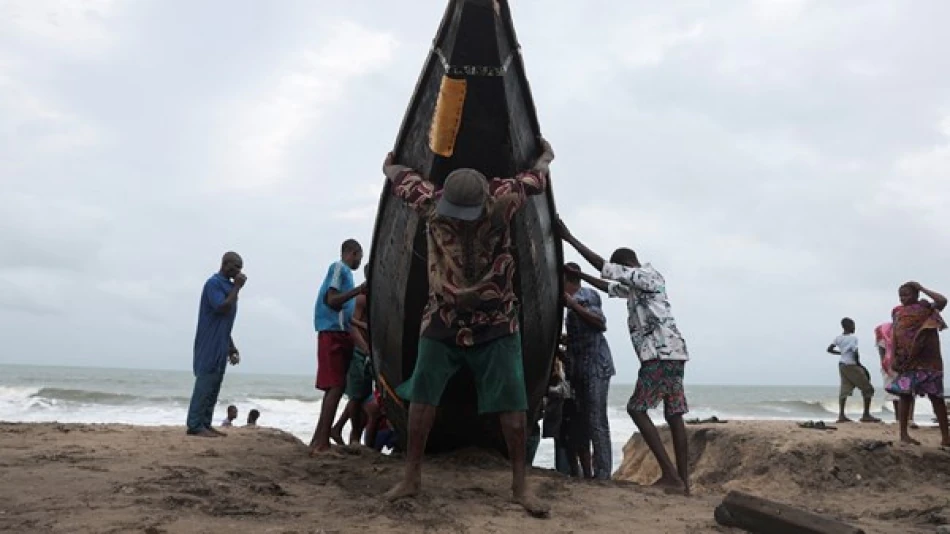
Deadly Clashes Force Nigerians to Flee Militant Attacks
Nigeria's Security Crisis Claims 13 Lives as Civilians Flee Bandits by River
A desperate escape from armed bandits turned tragic in Nigeria's Zamfara State, where at least 13 people drowned and 22 others remain missing after an overcrowded boat capsized while residents fled gunmen. The incident underscores Nigeria's deepening security crisis, where civilians increasingly find themselves trapped between violent criminal groups and inadequate state protection.
The Deadly Escape from Birnin Magaji
On Friday afternoon, armed groups known locally as bandits stormed two residential settlements in the Birnin Magaji area of northwestern Zamfara State. Faced with immediate danger, panicked residents rushed toward a nearby riverbank where only a single boat was available for evacuation.
Shihu Mohammed, a healthcare worker in Birnin Magaji, lost his eldest son and two female relatives in the tragedy. "Thirteen people died when the boat became severely overcrowded with people," he told local officials. Area chief Maidama Dankilo confirmed the death toll, adding that while 22 passengers were rescued, 22 others remain unaccounted for.
Zamfara: Nigeria's Banditry Epicenter
Zamfara State has become synonymous with Nigeria's banditry crisis, where criminal groups operate with near impunity across vast rural territories. These armed gangs, locally called "yan bindiga" or gunmen, have transformed from cattle rustlers into sophisticated criminal enterprises that kidnap for ransom, levy illegal taxes, and control entire communities.
The state's geography—dense forests and remote villages connected by poorly maintained roads—provides ideal cover for criminal operations. Nigerian security forces, stretched thin across multiple conflict zones, struggle to maintain consistent presence in these areas.
A Pattern of Violence and Desperation
This latest tragedy follows a particularly violent week in the region. Just days earlier, bandits killed at least two people and kidnapped over 100 others in an attack approximately 150 kilometers west of Birnin Magaji. Such mass abductions have become routine, with criminal groups often demanding millions of naira in ransom payments.
The boat disaster reveals how Nigeria's security vacuum forces civilians into impossible choices. Residents must decide between staying and risking death or kidnapping, or fleeing through dangerous terrain with inadequate escape routes. Friday's victims chose flight but found themselves in an equally deadly situation.
Economic and Social Implications
The ongoing insecurity in northwest Nigeria carries severe economic consequences for Africa's most populous nation. Agricultural production—critical for food security and export earnings—has plummeted as farmers abandon their lands. Many rural communities now exist in a state of perpetual displacement, unable to maintain normal economic activities.
For international investors and development partners, the deteriorating security situation represents a significant risk factor. Infrastructure projects, mining operations, and agricultural investments in affected regions face constant threats, limiting Nigeria's economic potential in key sectors.
Government Response Under Scrutiny
President Bola Tinubu's administration faces mounting pressure to address the security crisis that has persisted across multiple governments. Previous strategies—including military operations, negotiated amnesty programs, and telecommunications blackouts—have failed to provide lasting solutions.
The frequency of such incidents suggests that current security arrangements remain inadequate for protecting rural populations. Critics argue that without addressing underlying issues such as poverty, youth unemployment, and weak governance structures, tactical responses alone cannot resolve the crisis.
The Birnin Magaji boat tragedy represents more than an isolated incident—it symbolizes the human cost of Nigeria's failure to provide basic security for its citizens, forcing ordinary people into life-or-death situations that should never occur in a functioning state.
Most Viewed News

 Layla Al Mansoori
Layla Al Mansoori






